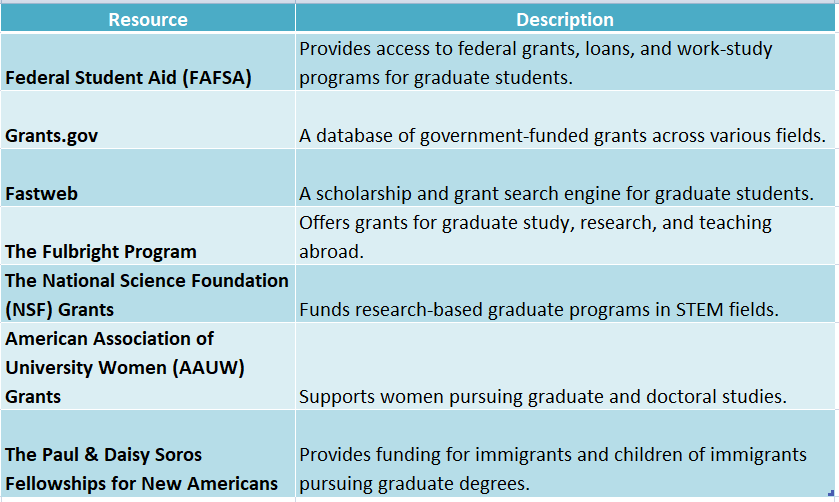Finding funding for your graduate studies can feel overwhelming, but knowing where to look for Graduate Studies Grants can open doors to new opportunities. These grants help alleviate financial stress, allowing you to concentrate on your education and research without the burden of student loans.
Explore University Resources
Many universities provide their own grants for graduate programs. Start by visiting your school’s financial aid office or graduate school website, where you can find tailored funding options for your field of study.
National Science Foundation Fellowships
If you’re studying in science, technology, engineering, or mathematics, consider applying for National Science Foundation Fellowships. These prestigious grants offer significant funding and can enhance your academic profile.
Online Grant Databases
Utilize online resources like Grants.gov and Fastweb to discover various grants for graduate programs. Simply input your field of study and interests to find potential funding opportunities.
Networking and Professional Organizations
Joining professional organizations in your field can be invaluable for finding grants. Many offer scholarships and funding opportunities for members, so connect with peers to uncover hidden gems.
Local and State Resources
Don’t forget local and state resources! Community foundations and state agencies often provide grants for graduate studies. Check their websites or contact them for available funding options.
Research Grants
If you’re engaged in research, seek out grants specifically aimed at funding research projects, as many organizations and agencies have dedicated funds for innovative work.
Contact Now to Pursue Your Dream Degree From Your Nearest College
Are You Eligible? Understanding Grant Requirements for Graduate Studies
Finding funding for your graduate studies can feel overwhelming, but understanding where to find grants is essential. Grants can significantly reduce your financial burden, allowing you to focus on your education without the stress of tuition fees.
Key Eligibility Criteria
When searching for graduate studies grants, knowing the eligibility requirements is crucial. Common criteria include:
- Academic Performance: A strong GPA is often required.
- Field of Study: Some grants are specific to disciplines like science or humanities.
- Financial Need: Many grants assess your financial situation, so be prepared to provide this information.
Explore National Science Foundation Fellowships
Consider the National Science Foundation Fellowships, which support students in STEM fields. If you’re pursuing a graduate program in these areas, check their website for application details and deadlines. Applying early can enhance your chances of receiving funding!
Additional Resources for Finding Grants
Explore various resources for grants:
- University Financial Aid Office: They usually have lists of available grants.
- Online Databases: Websites like Fastweb and Grants.gov can help you find opportunities.
- Professional Organizations: Many associations offer grants to students in specific fields.
Tips for Applying
When applying, remember to read requirements carefully, prepare your documents, and write a strong personal statement. Staying organized is key; create a spreadsheet to track deadlines and requirements for each grant. Applying for multiple grants increases your chances of funding your graduate studies.
Top Online Resources for Discovering Graduate Studies Grants

Finding funding for your graduate studies can feel overwhelming, but knowing where to look can make a significant difference. Grants for graduate programs are available from various sources, helping to ease your financial burden as you pursue your academic goals.
1. Government Websites
Start with resources like Grants.gov, which lists numerous graduate studies grants, including the National Science Foundation Fellowships. You can filter your search by field to find funding that fits your area of study.
2. University Financial Aid Offices
Don’t overlook your university’s financial aid office! They can guide you to specific grants for graduate programs and often have insider knowledge about lesser-known opportunities.
3. Professional Associations
Joining professional associations in your field can lead to exclusive grants. Many organizations offer scholarships and fellowships for graduate students, providing funding and networking opportunities.
4. Online Scholarship Databases
Websites like Fastweb and Cappex compile lists of scholarships and grants. By creating a profile, you can receive personalized matches for graduate studies grants that suit your qualifications.
5. Social Media and Forums
Social media platforms like LinkedIn and Facebook have groups dedicated to graduate funding. Engaging with these communities can provide tips and leads on grants you might not find elsewhere.
6. Research Institutions
Many research institutions offer grants for graduate studies, especially if your work aligns with their mission. Check their websites for funding opportunities or reach out to faculty members for guidance.
How to Write a Winning Grant Proposal for Graduate Studies
Finding funding for graduate studies can be challenging, but knowing where to look is essential. Graduate studies grants come from various sources, and navigating these options is crucial for your academic success.
Start with Research
Begin by exploring different types of grants for graduate programs. Look into university-specific scholarships, state grants, and national opportunities like the National Science Foundation Fellowships. Each has unique requirements, so read the guidelines carefully.
Crafting Your Proposal
Clarity is key when writing your proposal. Outline your research goals and explain how your work contributes to your field. Use simple language and avoid jargon, as reviewers may not be experts in your area.
Highlight Your Qualifications
Showcase your academic achievements and relevant experiences. Include previous research, internships, or projects that demonstrate your skills and dedication. The more you illustrate your potential, the better your chances of securing funding.
Budget Wisely
A well-prepared budget is essential. Clearly outline how you plan to use the funds, specifying expenses like tuition, research materials, and living costs. This transparency shows responsibility and careful planning.
Seek Feedback
Before submitting your proposal, seek feedback from mentors or peers. They can provide valuable insights and help refine your application. A fresh perspective can catch mistakes or suggest improvements, enhancing your proposal significantly.
Contact Now to Pursue Your Dream Degree From Your Nearest College
Exploring University-Specific Graduate Studies Grants
Finding funding for graduate studies can be challenging, but university-specific graduate studies grants offer a great solution. These grants can significantly reduce financial stress and enhance your educational experience. Here’s how to find these valuable resources!
Check Your University’s Financial Aid Office
Start with your university’s financial aid office, which typically has a list of available graduate studies grants tailored to their programs. Don’t hesitate to ask questions; they are there to assist you!
Research Department-Specific Opportunities
Many departments also offer their own grants for graduate programs. For instance, if you’re in the sciences, consider applying for National Science Foundation Fellowships, which provide substantial funding and are often less competitive than general grants.
Explore External Scholarships
Look beyond university grants to external scholarships from organizations, foundations, and local businesses. Websites like Fastweb and Scholarship.com can help you discover these opportunities. Tailor your applications to stand out!
Network with Faculty and Alumni
Networking is crucial! Speak with professors and alumni about available grants; they may know of lesser-known opportunities. These connections can also lead to mentorship throughout your studies.
Stay Updated on Grant Deadlines
Lastly, keep track of grant deadlines, as many have specific application periods. Create a calendar to stay organized and ensure you don’t miss out on funding opportunities that can support your academic journey.
The Role of Nonprofits and Foundations in Funding Graduate Studies
Finding funding for graduate studies can be challenging, but nonprofits and foundations are essential in making education more accessible. They offer various Graduate Studies Grants that help cover tuition and living expenses, turning the dream of advanced education into reality.
The Importance of Nonprofits and Foundations
These organizations often focus on specific fields, providing targeted support for students in particular Graduate Programs. For example, the National Science Foundation Fellowships support students in STEM fields, ensuring future innovators receive necessary funding.
How to Find These Grants
- Research Online: Use websites like Foundation Center and Grants.gov to find available grants.
- University Resources: Many universities have dedicated offices to assist students in locating funding.
- Networking: Connect with alumni or professionals who may know about specific grants. Exploring these avenues can uncover valuable resources for financing your studies.
Tips for Applying for Grants
Applying for Graduate Studies Grants can be competitive. Tailor your application to each grant’s requirements and highlight your unique experiences.
- Start Early: Allow ample time to gather documents and write essays.
- Seek Feedback: Have mentors or peers review your application before submission.
The Benefits of Grants
Grants for Graduate Programs alleviate financial burdens and enhance your resume. They demonstrate your commitment and expertise, making you more attractive to future employers, while allowing you to focus on your studies and research.
How CollegeDegree.Education Can Help You Navigate Graduate Studies Grant Options
Finding funding for your graduate studies can be daunting, but knowing where to look for Graduate Studies Grants can ease your journey. With the right resources, you can concentrate on your education rather than financial worries.
At CollegeDegree.Education, we streamline the search for Grants for Graduate Programs. Our extensive database connects you with funding opportunities tailored to your field, allowing you to filter grants based on your specific needs.
Key Resources to Explore
- National Science Foundation Fellowships: These fellowships support graduate students in science and engineering, providing funding and enhancing research experiences.
- University Financial Aid Offices: Reach out to your university’s staff for assistance in finding grants and scholarships.
- Online Grant Databases: Websites like Grants.gov list various funding opportunities that you can search by keywords.
Tips for Applying for Grants
To improve your chances of securing Graduate Studies Grants, consider these tips:
- Start Early: Allow ample time to gather documents and write essays.
- Follow Instructions: Read application guidelines carefully to meet all requirements.
- Personalize Your Application: Tailor your essays to showcase your unique experiences.
Networking for Opportunities
Networking can unlock funding opportunities. Consider joining professional organizations that offer scholarships and attending conferences to connect with mentors.
Stay Informed
Stay updated on deadlines and new grant announcements by subscribing to newsletters or following relevant social media accounts. This ensures you won’t miss valuable opportunities for your graduate studies.
Contact Now to Pursue Your Dream Degree From Your Nearest College
FAQs
1. What are graduate studies grants?
Graduate studies grants are financial awards provided to students pursuing a master’s or doctoral degree. These grants do not require repayment and are typically awarded based on financial need, merit, or specific research interests.
2. How do graduate grants differ from scholarships?
Grants are usually need-based, while scholarships are often merit-based. However, some grants also consider academic achievements and research proposals.
3. Who provides graduate studies grants?
Graduate grants can come from government agencies, universities, private organizations, and nonprofit foundations.
4. Who is eligible for graduate studies grants?
Eligibility criteria vary by grant, but common requirements include enrollment in an accredited graduate program, U.S. citizenship or permanent residency (for federal grants), and financial need. Some grants may be specific to certain fields of study or demographics.
5. How do I apply for a graduate grant?
Applications typically require submitting an online form, academic transcripts, a statement of purpose, letters of recommendation, and sometimes a research proposal.
6. Are there specific grants for minority or underrepresented students?
Yes, many grants are available for women, minorities, veterans, and students with disabilities. Organizations such as the National Science Foundation (NSF) and the Ford Foundation offer grants to support diversity in graduate education.


